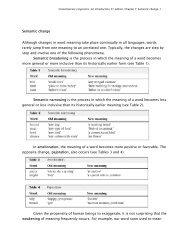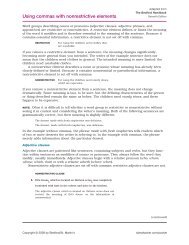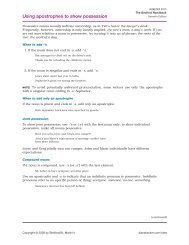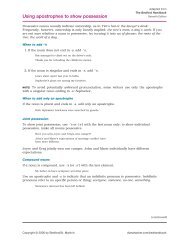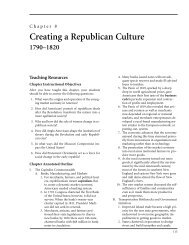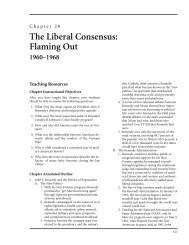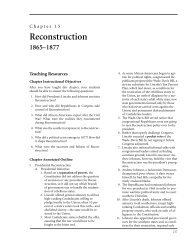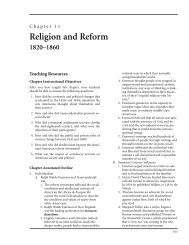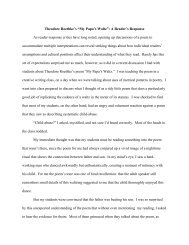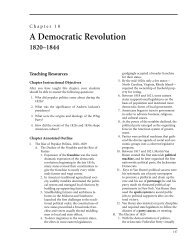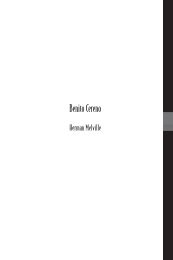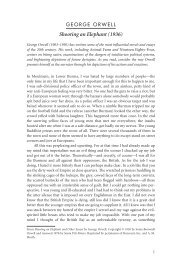GEORGE ORWELL, Politics and the English Language
GEORGE ORWELL, Politics and the English Language
GEORGE ORWELL, Politics and the English Language
You also want an ePaper? Increase the reach of your titles
YUMPU automatically turns print PDFs into web optimized ePapers that Google loves.
<strong>ORWELL</strong> <strong>Politics</strong> <strong>and</strong> <strong>the</strong> <strong>English</strong> <strong>Language</strong> 7<br />
blocking a sink. In (5), words <strong>and</strong> meaning have almost parted company. People<br />
who write in this manner usually have a general emotional meaning—<strong>the</strong>y dislike<br />
one thing <strong>and</strong> want to express solidarity with ano<strong>the</strong>r—but <strong>the</strong>y are not interested<br />
in <strong>the</strong> detail of what <strong>the</strong>y are saying. A scrupulous writer, in every sentence that he<br />
writes, will ask himself at least four questions, thus: What am I trying to say? What<br />
words will express it? What image or idiom will make it clearer? Is this image fresh<br />
enough to have an effect? And he will probably ask himself two more: Could I put<br />
it more shortly? Have I said anything that is avoidably ugly? But you are not<br />
obliged to go to all this trouble. You can shirk it by simply throwing your mind<br />
open <strong>and</strong> letting <strong>the</strong> ready-made phrases come crowding in. They will construct<br />
your sentences for you—even think your thoughts for you, to a certain extent—<br />
<strong>and</strong> at need <strong>the</strong>y will perform <strong>the</strong> important service of partially concealing your<br />
meaning even from yourself. It is at this point that <strong>the</strong> special connection between<br />
politics <strong>and</strong> <strong>the</strong> debasement of language becomes clear.<br />
In our time it is broadly true that political writing is bad writing. Where it is<br />
not true, it will generally be found that <strong>the</strong> writer is some kind of rebel, expressing<br />
his private opinions <strong>and</strong> not a “party line.” Orthodoxy, of whatever color, seems to<br />
dem<strong>and</strong> a lifeless, imitative style. The political dialects to be found in pamphlets,<br />
leading articles, manifestos, White Papers <strong>and</strong> <strong>the</strong> speeches of under-secretaries do,<br />
of course, vary from party to party, but <strong>the</strong>y are all alike in that one almost never<br />
finds in <strong>the</strong>m a fresh, vivid, home-made turn of speech. When one watches some<br />
tired hack on <strong>the</strong> platform mechanically repeating <strong>the</strong> familiar phrases—bestial<br />
atrocities, iron heel, bloodstained tyranny, free peoples of <strong>the</strong> world, st<strong>and</strong> shoulder to<br />
shoulder—one often has a curious feeling that one is not watching a live human<br />
being but some kind of dummy: a feeling which suddenly becomes stronger at moments<br />
when <strong>the</strong> light catches <strong>the</strong> speaker’s spectacles <strong>and</strong> turns <strong>the</strong>m into blank<br />
discs which seem to have no eyes behind <strong>the</strong>m. And this is not altoge<strong>the</strong>r fanciful.<br />
A speaker who uses that kind of phraseology has gone some distance towards turning<br />
himself into a machine. The appropriate noises are coming out of his larynx,<br />
but his brain is not involved as it would be if he were choosing his words for himself.<br />
If <strong>the</strong> speech he is making is one that he is accustomed to make over <strong>and</strong> over<br />
again, he may be almost unconscious of what he is saying, as one is when one utters<br />
<strong>the</strong> responses in church. And this reduced state of consciousness, if not indispensable,<br />
is at any rate favorable to political conformity.<br />
In our time, political speech <strong>and</strong> writing are largely <strong>the</strong> defense of <strong>the</strong> indefensible.<br />
Things like <strong>the</strong> continuance of British rule in India, <strong>the</strong> Russian<br />
purges <strong>and</strong> deportations, <strong>the</strong> dropping of <strong>the</strong> atom bombs on Japan, can indeed<br />
be defended, but only by arguments which are too brutal for most people to face,<br />
<strong>and</strong> which do not square with <strong>the</strong> professed aims of political parties. Thus political<br />
language has to consist largely of euphemism, question-begging <strong>and</strong> sheer<br />
cloudy vagueness. Defenseless villages are bombarded from <strong>the</strong> air, <strong>the</strong> inhabitants<br />
driven out into <strong>the</strong> countryside, <strong>the</strong> cattle machine-gunned, <strong>the</strong> huts set on<br />
fire with incendiary bullets: this is called pacification. Millions of peasants are<br />
robbed of <strong>the</strong>ir farms <strong>and</strong> sent trudging along <strong>the</strong> roads with no more than <strong>the</strong>y<br />
can carry: this is called transfer of population or rectification of frontiers. People are




